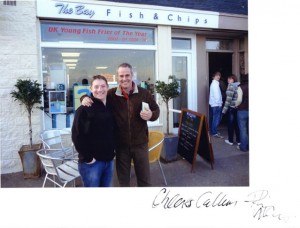While we wait for governments and big business to take the necessary big initiatives on climate change and sustainability that are really going to move us forward in this worrying area, some small businesses are just getting on with it.
Add them all up, and the significance of these individual actions is still tiny. But they provide real working examples, to encourage their neighbours and people in the same business, and very possibly draw in new custom through the publicity they generate. A good example is The Bay Fish and Chips (see their blog for Climate Week) and they provide a good positive story.
Bay Fish and Chips is a new business (started in 2008) in the seaside town of Stonehaven in Aberdeenshire. The premises are now powered with energy from 100% renewable sources, supplied by Good Energy, and they have just received the highest (three star) rating from the Sustainable Restaurant Association (SRA), of which Bay is a member. It also scored 100% in SRA’s sustainability rating survey.
Bay sources its fish “from renewable sources.” The fish to buy there is haddock. It says it is the first chippy in the UK “to gain MSC chain of custody to sell Scottish north sea haddock on our menu. This mean all our haddock products are traceable from sea to plate and we keep full records of this and they can be produced at any time if required.”
They cannot quite say the same for other fish, but they do say this: “We are at the forefront of seeking and using fully sustainable and traceable fish on our menu.”
Other produce is sourced within a 50-mile radius, “wherever possible,” to reduce food miles and support the local economy. “All of our waste oil in the shop is collected and recycled into bio diesel and we have recently started recycling our food waste and have teamed up with a local recycling firm which transforms food waste into compost, reducing the amount of waste going to landfill.”
The company cannot generate its own power. So instead it signed up with Good Energy (the UK’s only 100% renewable electricity supplier) which guarantees that the energy it uses comes from 100% renewable sources.
The Sustainable Restaurant Association, launched in March 2010, is a not for profit membership organisation (restaurants join as members) “helping restaurants become more sustainable and diners make more sustainable choices when dining out. We help our member restaurants source food more sustainably, manage resources more efficiently and work more closely with their community.”
This isn’t saying there are not equally environmentally committed restaurants in your neighbourhood. It’s just that it’s easier to find them when they’re listed by an association such as this.
So are we any better off after Climate Week? Probably, in the sense that there are a few more good examples we now know about, such as Bay Fish and Chips, out there. Other businesses have models to follow, and we have a few more places where we might find it easier to eat sustainably sourced food. So we’ve inched forward a bit on a landscape of formidable problems. Small progress, but it’s progress.

